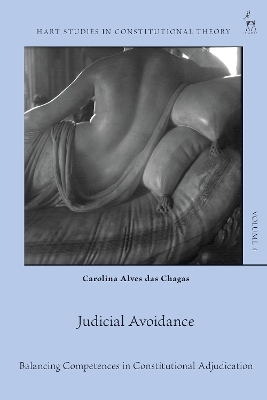
Judicial Avoidance
Balancing Competences in Constitutional Adjudication
Seiten
2025
Hart Publishing (Verlag)
978-1-5099-6153-5 (ISBN)
Hart Publishing (Verlag)
978-1-5099-6153-5 (ISBN)
- Noch nicht erschienen (ca. Februar 2025)
- Versandkostenfrei innerhalb Deutschlands
- Auch auf Rechnung
- Verfügbarkeit in der Filiale vor Ort prüfen
- Artikel merken
This book analyses cases of judicial avoidance: what happens when courts leave some or all of the merits of a case undecided?
It explores examples of justiciability assessments and deferential approaches regarding the decision of another authority and examines legitimacy issues involving judicial avoidance. The reader is presented with answers to two fundamental questions that guide the development of the book:
- Is it legitimate to practise judicial avoidance?
- How could judicial avoidance be practised legitimately?
The conflict of competences, which often emerges in instances of judicial avoidance, is an important book baseline. From this conflict, the book considers and defends the possibility of applying ‘formal balancing’ to provide a clearer structure of the exercise of justiciability and judicial deference. The ‘formal balancing’ methodology is based on Alexy’s principles theory, and its connection with judicial avoidance represents a significant contribution and novel point in constitutional adjudication.
It explores examples of justiciability assessments and deferential approaches regarding the decision of another authority and examines legitimacy issues involving judicial avoidance. The reader is presented with answers to two fundamental questions that guide the development of the book:
- Is it legitimate to practise judicial avoidance?
- How could judicial avoidance be practised legitimately?
The conflict of competences, which often emerges in instances of judicial avoidance, is an important book baseline. From this conflict, the book considers and defends the possibility of applying ‘formal balancing’ to provide a clearer structure of the exercise of justiciability and judicial deference. The ‘formal balancing’ methodology is based on Alexy’s principles theory, and its connection with judicial avoidance represents a significant contribution and novel point in constitutional adjudication.
Carolina Alves das Chagas is Programme Coordinator at the United Nations Office on Drugs and Crime, Austria.
1. Introduction
Part One: First Legitimacy Question: Are Judicial Avoidance Practices Legitimate?
2. Judicial Avoidance: A Matter of Competence
3. Judicial Avoidance and the Rule of Law
Part Two: Second Legitimacy Question: The Methodology for Legitimate Judicial Avoidance
4. Competence as Rules and Principles
5. Judicial Avoidance and the Balancing Method
6. Balancing Specificities in Judicial Avoidance
Part Three: Instances of Avoidance and Legitimate Practice
7. Admissibility Control: Establishing the Courts’ Competence
8. Merits Avoidance: The Degree of the Courts’ Scrutiny
| Erscheinungsdatum | 05.08.2023 |
|---|---|
| Reihe/Serie | Hart Studies in Constitutional Theory |
| Verlagsort | Oxford |
| Sprache | englisch |
| Maße | 156 x 234 mm |
| Themenwelt | Recht / Steuern ► Allgemeines / Lexika |
| Recht / Steuern ► EU / Internationales Recht | |
| Recht / Steuern ► Öffentliches Recht ► Verfassungsrecht | |
| Recht / Steuern ► Privatrecht / Bürgerliches Recht ► Zivilverfahrensrecht | |
| Sozialwissenschaften ► Politik / Verwaltung ► Staat / Verwaltung | |
| ISBN-10 | 1-5099-6153-4 / 1509961534 |
| ISBN-13 | 978-1-5099-6153-5 / 9781509961535 |
| Zustand | Neuware |
| Haben Sie eine Frage zum Produkt? |
Mehr entdecken
aus dem Bereich
aus dem Bereich
Buch | Hardcover (2024)
C.H.Beck (Verlag)
75,00 €


